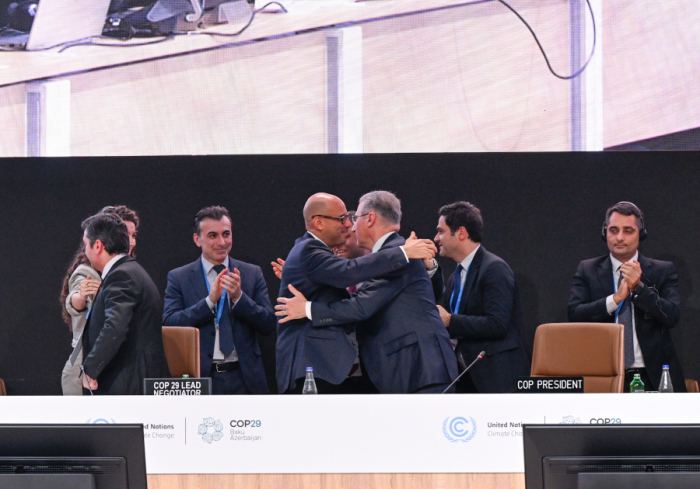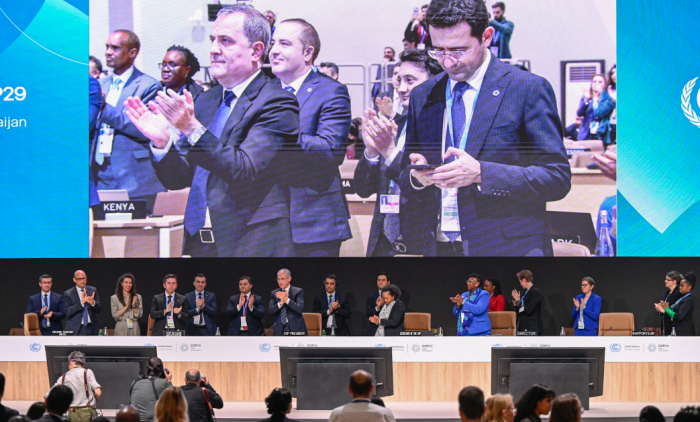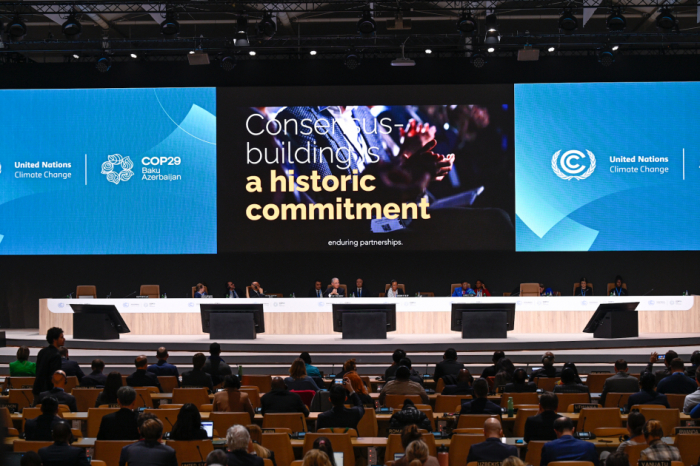The closing plenary of the 29th session of the Conference of the Parties (COP29) to the United Nations Framework Convention on Climate Change took place on November 23 in Baku.
“We have all been working very hard over the past two weeks. None of us want to leave Baku without achieving a good outcome on our key deliverable. The eyes of the world are intently focused on us. I urge you to step up your engagement with one another to bridge the remaining divide,” said Mukhtar Babayev, COP29 President and Azerbaijan’s Minister of Ecology and Natural Resources.
“The COP30 conference, to be held in Brazil, should serve as a model of strengthened collaboration among all countries,” emphasized Marina Silva, Brazil’s Minister of Environment.
She highlighted the importance of achieving a final agreement despite the challenges encountered during COP29 discussions. “We must unite our efforts to reach a final agreement. Given the crisis we are facing, such issues require urgent solutions. The success of this agreement depends on building solidarity among the parties. Society expects us to move forward with responsible actions,” the minister added.
Later, the reports from the discussions and the protocols of the meetings held within the framework of COP29 were approved, and the agreed documents were ratified. A resolution officially expressing gratitude to Azerbaijan for the exemplary organization of COP29 was adopted.
The COP29 Presidency also announced the conclusion of the decade-long negotiations on high-integrity carbon markets under Article 6 of the Paris Agreement. This was one of the Presidency’s top priorities for the year and was achieved through intensive dual-track technical and political negotiations. This strategy broke years of stalemate, finalizing the last outstanding item in the Paris Agreement. Article 6 provides trusted and transparent carbon markets for countries as they collaborate to reach their climate goals. This cross-border cooperation is expected to reduce the cost of implementing countries’ national climate plans (NDCs) by up to $250 billion per year. The COP29 Presidency encourages Parties to reinvest these savings in even greater climate ambition. The next generation of NDCs, due in February, will be critical for the world’s hopes of keeping the 1.5-degree goal within reach. Today’s milestone has been reached just in time to aid countries in committing to more ambitious climate plans. Article 6 is one of the most complex and technical challenges in climate diplomacy. Its successful adoption means coal plants decommissioned, wind farms built, and forests planted. It means a new wave of investment in the developing world. The decisions unanimously adopted on Article 6 will play a pivotal role in ensuring the environmental integrity, transparency, and robustness of carbon markets through real, additional, verified, and measurable emission reductions and removals, while also unleashing their enormous potential to drive global climate investment. The guidelines and rules adopted are designed to ensure that carbon projects maintain practicality and inclusivity, respect human rights, and support sustainable development, enabling countries and project developers to cooperate under the Paris Agreement with confidence.
At the closing plenary, a decision was made to ensure the full operationalization of the Loss and Damage Fund, long awaited by developing countries, including small island states, least developed countries, and African nations. This aligns with the priority set by Ilham Aliyev, President of the Republic of Azerbaijan, to address the challenges posed by climate change impacts on small island states under the COP29 Presidency. The establishment of the Loss and Damage Fund was agreed upon during COP27 held in Egypt. The fund aims to provide financial assistance to countries most vulnerable to the impacts of climate change. During COP28 in the United Arab Emirates, a decision was made to launch the Fund's operations. The COP29 Presidency has taken significant steps to ensure the Fund's operationalization, working closely with its Board and the World Bank. In September of this year, during the Fund's third Board meeting held in Baku, critical measures were taken to commence its operations, including the appointment of Ibrahima Cheikh Diong as the Fund's Executive Director.
Within the framework of COP29, several important agreements related to the Loss and Damage Fund were signed. These include the "Trustee Agreement" and "Secretariat Hosting Agreement" between the Fund's Board and the World Bank, as well as the "Host Country Agreement" between the Fund's Board and the host country, the Republic of the Philippines. To date, the total pledged financial support for the Fund exceeds $730 million. With these achievements, the Loss and Damage Fund will be able to start financing projects beginning in 2025. This marks yet another success of Azerbaijan's COP29 Presidency.
During the closing plenary, a decision was adopted regarding the preparation of Biennial Transparency Reports (BTRs) in line with Article 13 of the Paris Agreement. The decision emphasizes providing financial and technical support to developing countries for capacity-building efforts and the preparation of these reports. It highlights the implementation of the Enhanced Transparency Framework established by Article 13, which includes financial and technical assistance to support developing nations in meeting their reporting obligations. Additionally, the decision acknowledged the Baku Global Climate Transparency Platform, an initiative by the COP29 Presidency. The platform was praised for advancing climate transparency through significant activities such as forums and capacity-building training sessions. The establishment of the Baku Global Climate Transparency Platform, a key legacy of COP29 in the field of climate transparency, has been commended by partner countries.
At the COP29 closing plenary, a landmark New Collective Quantified Goal (NCQG) on climate finance was adopted. The agreement commits developed nations to mobilize at least $300 billion annually by 2035 to support climate action in developing countries, significantly increasing the current $100 billion target. Funding will be drawn from public, private, and multilateral sources, while developing countries are encouraged to contribute voluntarily.
Key documents were also approved, including strategies on Gender and Climate Change, the Global Goal on Adaptation, and the Sharm El-Sheikh Mitigation Ambition and Implementation Work Program.
UNFCCC Executive Secretary Simon Stiell highlighted the importance of COP29's outcomes, particularly the tripling of the climate finance target, describing it as essential for aiding those most affected by climate change. He also praised the historic agreement on a global carbon market, achieved after a decade of negotiations.
COP29 President Mukhtar Babayev extended his gratitude to Azerbaijani President Ilham Aliyev for supporting the event’s high-level organization. He also acknowledged the contributions of UN leadership, Azerbaijan’s state agencies, the COP29 Operating Company, and the volunteers who ensured the conference’s success.
The session concluded with speeches from representatives of various countries.



